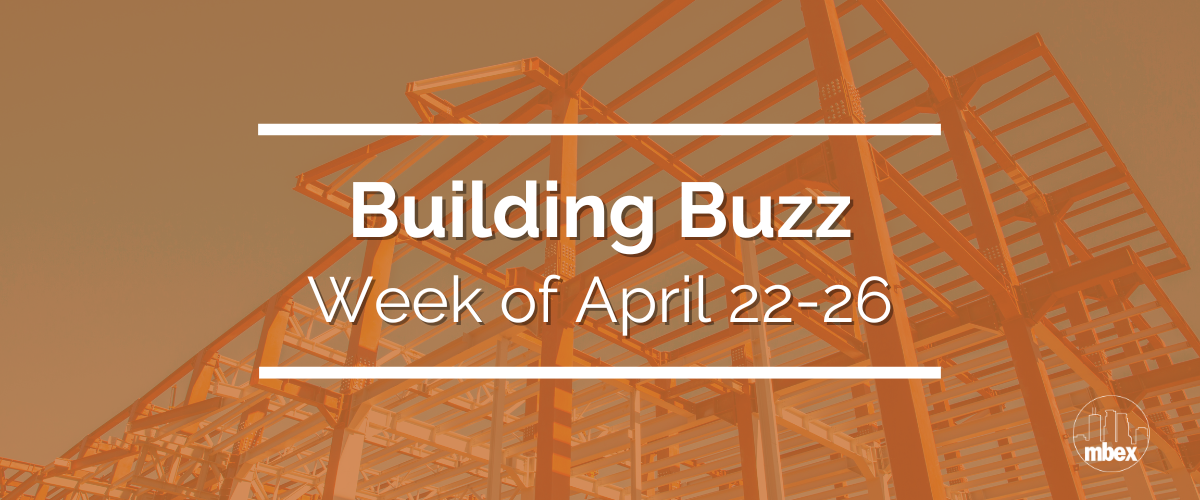Building Buzz: July 15 - 19

We're reading the headlines so you don't have to.
From changes to the Lead & Copper rule to construction project abandonments and a 170-unit affordable housing project in Burnsville to Full Tilt Tavern in Blooomington expanding to add a 2-story slide, here's what was buzzing in the building world the week of July 15-19, 2024:
JULY 15
Construction input prices dip for second straight month
Construction input prices ticked down 0.3% in June due to fewer projects getting off the ground across various sectors, according to an Associated Builders and Contractors' analysis of U.S. Bureau of Labor Statistics. Both overall and nonresidential construction costs remain 1.1% and 0.7%, respectively, than a year ago, according to the report. "Construction material prices dipped in June, perhaps a reflection of declining project starts in a number of construction segments and an associated dip in demand," said Anirban Basu, ABC chief economist. "For instance, input prices fell in the milti-family segment, where many contractors indicate substantial softening of demand for their services. The same was true of input prices in commercial construction segments." (Construction Dive)
Davis marks opening of surgical center in Eagan
Davis announced the formal opening of Eagan Specialty Center, a 36,100-square-foot Class-A surgical facility at 2975 Holiday Court. The building is the new home of Midwest Surgery Center, which occupies 27,000-square-feet. Midwest Surgery Center, a local Ambulatory Surgery Center in Woodbury, was faced with the issue of whether to expand at its existing space or build a new facility to meet market demand. Midwest Surgery is a joint venture between St. Paul Eye Clinic and Midwest ENT. (RE Journals)
Developer plans 153-unit market-rate apartments along Edina's France Avenue
Co-developers Orion Investments, which is based in Edina, and Minneapolis-based Afton Park requested final site plan approval to move forward with a 153-unit market-rate apartment building on the northern portion of a 5-acre project site, located at 7200 and 7250 France Avenue. As part of a 2022 approval, Orion could move forward with the construction of a 125,000-square-foot office building planned for the southern portion of the site. But construction of office building hasn't yet started. Orion's Drew Stafford attributes this delay to a tough commercial real estate financial landscape, including high interest rates. He expected construction on the office portion to begin this fall. At the time of the council approval, the development team --- which then did not include Afton Park --- had not yet solidified exactly what type of use would be established on the northern portion of the site. The developer has later pitched a hotel use. (Minneapolis - St. Paul Business Journal)
Engineering firm to help plan for Milwaukee's Northridge Mall redevelopment
The city''s Redevelopment Authority chose Milwaukee-based GRAEF to enter a contract for planning, urban design and market analysis services of the 53-acre mall site, according to an agenda. The contract was worth $125,000 and most of the money comes from a Wisconsin Economic Development Corp. grant. The money is meant for advancing market interviews, engaging with the community, and researching the existing conditions of the project area. The city expects mechanical demolition to start in the fall or winter of 2024 and wrap up in summer 2025 as an eight- to -10-month process. After demolition, around 53-acres of land will be open for development. (Finance & Commerce)
Getting the lead out: Tackling changes to the Lead & Copper Rule
The EPA's proposed rule would require water systems across the country to replace millions of lead services lines within the next decade. This comes on the heels of a broader effort under the Biden-Harris administration to eliminate 100% of lead pipes in the U.S. Grappling with aging infrastructure, a chronic skills shortage and a growing population, U.S. water utilities are currently facing a significant challenge. It also comes at a time when the water sector's performance will be exposed to increasing scrutiny with utilities now required to report on everything from infrastructure performance to cybersecurity threats. While major improvements are currently underwater, efforts to repair, upgrade or expand water networks are being hampered by a wave of industry retirements that could see vital engineering skills lost forever. (Construction Business Owner)
Lakeville to consider 167-unit townhome development
The development would spread 167 units across 13 buildings, according to documents. This comes less than a month after the city approved two single-story medical offices to be developed by Davis Healthcare Real Estate to the southeast of this proposed housing, as previously reported by Finance & Commerce. Planning documents show there will be 67 townhome units with one bedroom, another 92 units with be dedicated to two-bedroom units, while the remaining eight units will be for three bedrooms. Dubbed Sundance Lakeville Second Addition, the project will also feature a 5,000-square-foot clubhouse and swimming pool for tenant use. (Finance & Commerce)
Land deal with U of M advances Rosemount middle school project
The Rosemount-Apple Valley-Eagan School District has a deal in place to buy a big chunk of University of Minnesota-owned UMore Park land in Rosemount for construction of a new $135-million middle school, a project that will replace the oldest building in the district. The district hopes to begin construction this fall on the middle school project, which was funded as part of the $493-million bond referendum approved by district voters in May 2023 --- the largest successful ballot initiative of its kind in Minnesota's history. (Finance & Commerce)
Minnesota Legislature enacts pay transparency law & updates paid sick leave and other employment laws
Minnesota employers should be aware of several new employment laws that were included in the Omnibus Labor and Industry Policy bill and Omnibus Tax bill that were signed into law at the end of May, just before the close of the 2024 legislative session. Some of these laws take effect next year, but others take effect as soon as July and August 2024. Check out this summarization of the most significant enactments and updates in this White Paper. (J D Supra)
JULY 16
Big Island Bouldering looking to open first location in Plymouth
Chris Massoll is looking to open the west metro's first indoor bouldering gym with a 20,000-square-foot facility in Plymouth. Massoll is the owner of Minnetonka-based Big Island Bouldering and has applied to the city of Plymouth for a conditional use permit to open the gym at 161 Cheshire Lane North, which is home to a 70,000-square-foot multi-tenant building within an industrial park. Along with a rock wall, the facility will include a gym, co-working space, fitness training, shower and locker facilities and event spaces. Massoll plans to offer monthly and annual memberships as well as day passes. He hire hired Bend, Oregon-based EP Climbing to build the rock walls. While the Plymouth location would be Massoll's first, he already has his sights set on expansion. (Minneapolis - St. Paul Business Journal)
Construction project abandonments surge
Project abandonments surged 10.7% over the past month, according to Cincinnati-based ConstructConnect's Project Stress Index, a measure of construction projects that have been paused, abandoned, or have delayed bit date. Delayed bid activity posted no change in June, while work put on hold decreased 6.6%. Overall, the Project Stress Index increased 1.5% last month. The latest stress data continues to emphasize the differences in public and private construction projects. One the private side, projects put on hold fell about 11.5% year over year. Public projects put on hold, which include infrastructure work, increased 5.2% compared to other same week a year ago, according to ConstructConnect. (Construction Dive)
Construction spending expected to rise, despite labor and materials snags
In the first half of 2024, construction costs stabilized. And through the remainder of this year, total cost growth is projected to be modest, and matched by an overall increase in construction spending. That prediction can be found in JLL's 2024 Midyear Construction Update and Forecast, released on July 16th. JLL bases its market analyses on insights gleaned from its global team of more than 550 research professionals who track economic and property trends and forecast future conditions in over 60 countries. The Update acknowledges that the industry has been adjusting to new patterns of demand, as not all sectors are performing equally well. Interest in projects in general has increased, lending regulations are not tightening, and spending is up more than originally anticipated. (Building Design + Construction)
New senior housing coming to St. Francis despite tough lending environment
A Champlin-based senior housing provider that focuses primarily on rural areas is poised to bring 134 much-needed senior housing units to St. Francis, a town of about 8,400 residents in the Cambridge-Isanti area. The Vista Prairie Communities project, which broke ground in June, will address a big housing need in the city, but cobbling together financing for the new homes was no simple task. The project, developed by Maplewood-based EDI, will create 59 independent living, 43 assisting living, 24 memory care, and 8 "care suite" homes on a roughly 17-acre site at 23440 Ambassador Boulevard Northwest in St. Francis. Bauer Design Build is the builder and Pope Architects has design duties. Scheduled for completion in November 2025, the development was funded in part with a $7.1-million loan from PACE Loan Group. The PACE loan will finance renewable and energy conservation features related to the building envelope, windows, lighting systems and controls, and more. (Finance & Commerce)
JULY 17
$5B awarded to aging bridges barely makes dent in needed repairs across U.S.
Dozens of aging bridges in 16 states will be replaced or improved with the help of $5-billion in federal grants by President Joe Biden's administration, the latest beneficiaries of a massive infrastructure law. The projects range from coast to coast, with the largest providing an additional $1.4-billion to help replace two vertical lift bridges over the Columbia River that carry Interstate 5 traffic between Portland, Oregon, and Vancouver, Washington. The bridges, which also received $600-million in December, are "the worst trucking bottleneck" in the region, Transportation Secretary Pete Buttigieg said. Other projects receiving $500-million or more include the Sagamore Bridge in Cape Cod, Massachusetts; an Interstate 10 bridge project in Mobile, Alabama; and the Interstate 83 South bridge in Harrisburg, Pennsylvania, which Buttigieg planned to highlight with a visit. (Finance & Commerce)
AIA sees slower construction spending in '25
Spending on nonresidential buildings will increase more than 7% this year, but market challenges will limit growth to 2% in 2025, according to the American Institute of Architects' newly released midyear Consensus Construction Forecast. In the report, AIA predicts the following: Commercial facilities activity will be flat this year and next year; manufacturing will increase 14% and stabilize in 2025; institutional construction will see a more than 10% gain this year and slow to 4% in 2025. (Finance & Commerce)
New apartment complex in Blaine hits the market
An apartment building in Blaine that has over 145 of its 152 apartment buildings leased up has been put on the market, Michel Commercial Real Estate said. The property, Glenfield Park Estates, was listed by its builder Kueper Architects & Builders, which completed the development in 2023. Amenities at the property include in-unit laundry, a fitness center, a movie theater, and an outdoor pool and children's play area. The amenities, combined with the quality construction of the property and population growth being experienced in Blaine is what brought up a fast lease-up process. (Finance & Commerce)
Roers Cos. gets council nod for 170-unit affordable apartment project in Burnsville
Burnsville's City Council signed off on a final plat for the project, essentially clearing the way for construction on a 4.47-acre, transit-oriented site at 175 Burnsville Parkway West. To make way for the new building, Roers plans to demolish the office buildings at 151 and 201 Burnsville Parkway, according to a city staff report. Replacing the office structures will be a building with four stories of apartments, one level of below-grade parking, and amenities such as fitness and community rooms. Outdoor attractions will include a dog run, a playground and a large rooftop deck, according to a project narrative from design firm Kaas Wilson. (Finance & Commerce)
JULY 18
Large industrial park proposed for New Market Township
Mesenbrink Construction & Engineering of Prior Lake wants to create a 22-lot industrial park on roughly 96-acres of existing farmland at 22230 Lyndale Avenue in the township, according to an Environmental Assessment Worksheet released. The EAW reveals that the buildings would range in size from 10,000- to -75,000-square-feet on the development site, which includes about 20-acres west of Lyndale Avenue and 76-acres to the east. The combined total square footage would range from about 300,000 to 850,000. The Chanhassen project, known as the Audobon Business Park, is scheduled for completion in January 2026. (Finance & Commerce)
Neon moves forward on north Minneapolis food incubator
Neon, a nonprofit organization that supports entrepreneurs in north Minneapolis, said that the Minneapolis Planning Commission approved its land use plan for its commercial kitchen incubator. Plans submitted by North Minneapolis design firm LSE Architects show a two-story community hub featuring nearly 25,000-square-feet of commercial kitchens, food storage space, farmers markets, a classroom, a food photography studio and administrative offices. The facility would be located at 2103 West Broadway Avenue --- currently a vacant parking lot between the Capri Theater and fast-food restaurant Olympic Café Plus. (Minneapolis - St Paul Business Journal)
JULY 19
Construction input prices 1.1% higher than year ago
Input prices fell 0.3% in June compared to May, an Associated Builders and Contractors analysis of U.S. Bureau of Labor Statistics data showed. The mid-July analysis reported that nonresidential construction input prices fell 0.4% for the month. Overall construction input prices are 1.1% higher than they were a year ago, and nonresidential construction input prices are 0.7% higher, according to the report. Natural gas prices shot up 36.3% over one month, while the aggregate price of unprocessed energy materials was up 4.7%. Crude petroleum prices were down 0.2%, the report added. In a previous report, ABC members reported stable backlog and steady confidence in both of the association's indicators. However, experts say there are still reasons for concern. (Finance & Commerce)
Engineers developing environmental and construction technologies for life on Mars
After the Moon, the next logical place for humans to live beyond Earth is Mars. But is it possible to terraform Mars --- that is, transform is to resemble Earth and support life? Or is that just the musings of science fiction? To live on Mars, humans will need liquid water, food, shelter and an atmosphere with enough oxygen to breathe and thick enough to retain heat and protect against radiation from the Sun. One recent study proposed that Mars colonists could spread aerogel, an ultralight solid material, on the ground. The aerogel would act as insulation and trap heat. This could be done all over Mars, including the polar ice caps, where the aerogel could melt the existing ice to make liquid water. (Finance & Commerce)
Finance & Commerce's Top Projects of 2023
The construction industry continued to experience its fair share of challenges in 2023. From persistent inflation to higher interest rates and labor shortages, developers have had to be flexible and steadfast to get projects from the proposal stage to completion. Despite all those challenges, last year saw so many successful project completions that 54 honorees were selected for Finance & Commerce's annual Top Projects awards. (Finance & Commerce)
Full Tilt Tavern in Bloomington to upgrade patio, add 2-story slide
Somewhere between an arcade, bar and restaurant, Full Tilt is a "connection brand," owner and restaurateur Mike Tupa said. The expansion builds on that, bringing a two-level patio to the spot at 8301 Normandale Boulevard to help create a comfortable social experience for guests. The second floor of the patio will have full bar service and a slide that can bring customers back down to the first floor. The restaurant is over 12,000-square-feet, and the expansion will add another 2,600-square-feet of space, which includes a 70-seat patio downstairs and a 156-seat rooftop patio. (Minneapolis - St Paul Business Journal)
Waukesha technical college developing YMCA facility
The YMCA of Greater Waukesha County and Waukesha County Technical College will partner on developing a modern YMCA facility on the main campus of 800 West Main Street in Pewaukee, officials said in a news release. The facility will serve residents of Waukesha County and surrounding areas as well as students, staff and college faculty, officials added. YGWC will launch a capital campaign with a $30-million goal to build the new facility, officials said. Project planning and fundraising is expected to take two to three years. The new facility will host fitness, health and recreational programs and a drop-in child watch service during scheduled hours. Project partners include the village of Pewaukee, Milwaukee-based Kahler Slater and Pewaukee-based VJS Construction Services. (Finance & Commerce)











